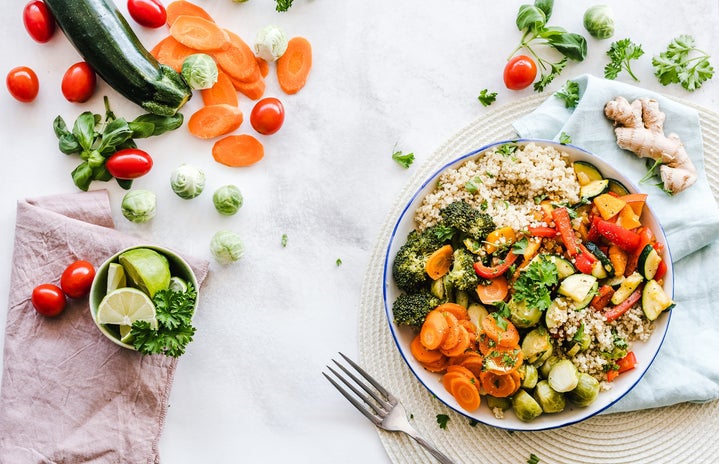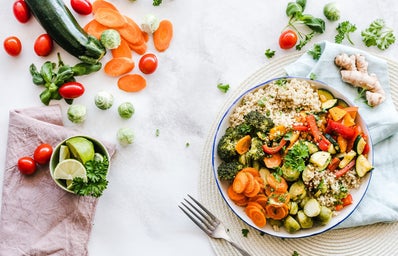With bathing suit season coming just around the corner, the pressure of “hot girl” summer (however toxic this ideal may be) is on. Arguably, many girls will feel even more stressed as we all transition out of quarantine and back into the real world.
First of all, every woman needs to do what is right for themselves, not what society thinks is right. However, if you’re attempting to lose weight, just exercising is not going to do the trick. Hitting the gym is not going to be the end all be all, and in some cases, can actually have detrimental effects. Instead of focusing on lifting the most weight or running that extra mile, it might be time to evaluate what kind of food is powering your body.

Most of us have heard the “nutrition talk” before: eat x amounts of fruit and vegetables per day, eat x amount of proteins, etc., a long, boring, droning conversation that never seems to end. Especially as busy college students, most of us are lucky if we manage to fit in three meals a day, largely ignoring anything about their nutritional value. Yet, nutrition facts have more power than many of us think they do. For example, take a 20 ounce soda can. To burn this off, you would need to walk four and a half miles in a day. That’s not bad right? But now, take a supersized fast food meal. To burn this off, you would need to walk four and a half miles everyday for a week. Now if you eat one of those everyday, it would require running a marathon everyday to burn it off. I think that I speak for the majority of people when I say that this is simply not feasible.This means that even if you are staying active, as per CDC guidelines, the amount of calories that you are consuming does not equal or surpass the amount that you are burning, through exercise as least. This obliterates the whole point of even trying to lose weight because, at the end of the day, you are still consuming more calories than are being burned which will actually lead to weight gain.
In theory, all calories are the same: it’s the amount of energy required to raise one gram of water by one degree celsius. Unfortunately, this theory is not applicable in real life situations. It’s time to debunk the myth that all calories are the same, in the sense of food composition. For example, take Morgan Spurlock, the star of the documentary Super Size Me, in which he ate only McDonald’s food for one month. He lost muscle mass, gained 24.5 lbs in fat, and had increased cholesterol levels over the one month period. His experiment perfectly encapsulates the fact that not all food is good food. The chemical bonds in our food store information and control how our bodies react. Dr. Mark Hyman draws a well illustrated comparison on the bodily processes when 750 calories of soda are consumed versus 750 calories of broccoli. Consuming 750 calories soda, also known as 46 teaspoons of sugar, activates fat producing cells in the liver, stimulates insulin production pathways (which can eventually lead to insulin resistance and then diabetes over time), and stimulates parts of your brain that convince you that you are not full which prompts an even greater caloric intake. This is not even to mention the adverse side effects of sugar such as increased bowel inflammation and decreased fertility levels. On the other hand, 750 calories of broccoli (approximately 21 cups) can have a healing effect on the body as it’s high fiber concentrations ensure that it is absorbed into the body slowly aiding in the feeling of fullness in addition to containing high levels of vitamin C, folate, and other macro and micro nutrients which protect against cancer and heart disease. This example clearly illustrates the differences in caloric intake and importance of a balanced diet.
Providing your body with the correct nutrients that it needs to function will help in overall metabolic processes and improve overall health and well being. This isn’t to say that staying active is not important as it can improve insulin sensitivity, reduce stress, and reduce the risk for chronic disease. Furthermore, exercise improves overall fitness, but it is not necessarily the right way to weight loss. It needs to be paired with lifestyle changes, most importantly, a healthy, well-rounded diet.
The human body is amazing and is capable of doing amazing things, when we treat it correctly. Hence, it’s important to eat a balanced diet of protein, carbohydrates, and a whole lot of green, leafy vegetables while minimizing sugar and unhealthy fat intake. Breaking a habit is hard and as such requires time, patience, and forgiveness. As such, don’t try to quit cold turkey, or expect life altering results immediately. Even once a healthy eating habit is built up over time it’s usually not feasible, or healthy, to require yourself to eat these food items all of the time. It can get tiring and frustrating to deprive yourself of foods that will make you happy and can lead to binging habits which are extremely detrimental to your health. That’s why, most experts recommend an 80-20 balance.
The way to a healthy future is through a consistently healthy, nutritious, and well balanced diet. Eating right can improve brain function, increase energy levels, and decrease stress and anxiety. And, when paired with proper exercise, the results can be astounding whether the goal is to increase muscle mass and fitness levels or to lose weight.


